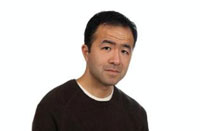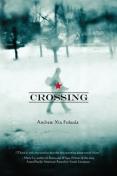BKMT READING GUIDES
Crossing
by Andrew Xia Fukuda
Paperback : 213 pages
0 club reading this now
0 members have read this book
Xing’s quiet adolescent ...
Introduction
A loner in his all-white high school, Chinese-born Xing (pronounced “Shing”) is a wallflower longing for acceptance. His isolation is intensified by his increasingly awkward and undeniable crush on his only friend, the beautiful and brilliant Naomi Lee.
Xing’s quiet adolescent existence is rattled when a series of disappearances rock his high school and fear ripples through the blue collar community in which he lives.
Amidst the chaos surrounding him, only Xing, alone on the sidelines of life, takes notice of some peculiar sightings around town. He begins to investigate with the hope that if he can help put an end to the disappearances, he will finally win the acceptance for which he has longed. However, as Xing draws closer to unveiling the identity of the abductor, he senses a noose of suspicion tightening around his own neck.
While Xing races to solve the mystery and clear his name, Crossing hurtles readers towards a chilling climax.
Editorial Review
Amazon Exclusive: A Q&A with Author Andrew Fukuda

Question: Crossing is the story of Xing Xu, a Chinese teenager growing up in a small town in upstate New York. Xing is a loner who doesn’t fit in at school and when a rash of disappearances rattle the town, suspicion is immediately cast in his direction. Where did you get the inspiration for this book?
Andrew Fukuda: I worked for a few years with immigrant teens in Manhattan's Chinatown. What really struck me was how acutely they felt isolated from society at large. Shoved out of the way, really. And they shared a real disenchantment with America. One Sunday, a group of us--we were traveling in upstate New York--decided to attend church. It turned out to be an all-white church and I still remember the cold looks of suspicion and icy stares cast our way throughout the service. Just because we were Chinese, just because we looked different. Those cold stares haunted me for a long time afterward. It got me thinking: what if an immigrant teen had to grow up all alone in this kind of community? And what if something terribly, mysteriously awful started to happen in that community?
The 2007 Virginia Tech massacre at the hands of Seung-Hui Cho added urgency to my writing. I feel that Asian American males have often been dealt an unfair hand by the media, and I was afraid of a backlash, afraid that we might get typecast as raging, hate-filled, gun-toting campus killers. For weeks after, I attacked the manuscript with renewed fervor and purpose, determined to add more dimensionality to Xing's character. Realistic complexity and nuance in characters, after all, kill stereotypes.
Question: In what way is Crossing different from the typical immigrant novel?
Andrew Fukuda: I wanted to depart from what we usually see in immigrant novels: instead of cloying and clichéd scenes of family meals, flowery mother-daughter relationships, and cathartic returns to the motherland, I wanted to layer questions of identity and ethnicity over a thriller plotline. In Crossing, this immigrant theme is propelled forward by the suspense generated in the ever-deepening mystery of the disappearances. This fusion of themes was a blend of my background: as an Asian American I was able to add depth to the ethnic theme; as a criminal prosecutor, I was able to develop nuances in the mystery aspect of the novel.
Question: Did you read much while growing up? Which writers capture your attention and imagination?
Andrew Fukuda: My parents--both university professors--encouraged me and my two brothers to read early on. Books lay everywhere at home. I suppose it was only a matter of time before I became a voracious reader. I was especially drawn to stories dealing with displacement, where characters suddenly find themselves in an alien environment with all previous reference points and cultural markers gone. Early on, that meant reading a lot of Stephen King, Ray Bradbury, and Isaac Asimov. Now it means more Kazuo Ishiguro, Paul Yoon, and, of course, Jhumpa Lahiri. Reading (and rereading) her works is like a religious experience for me.
Discussion Questions
No discussion questions at this time.Book Club Recommendations
Recommended to book clubs by 0 of 0 members.
Book Club HQ to over 90,000+ book clubs and ready to welcome yours.
Get free weekly updates on top club picks, book giveaways, author events and more








